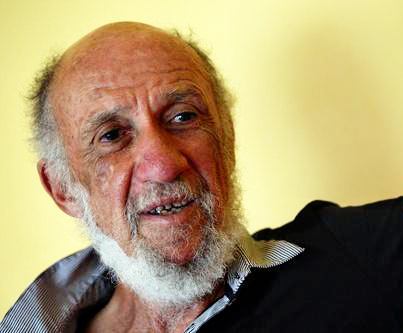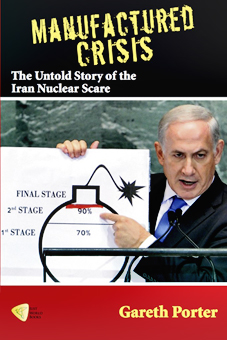Archive for the ‘New books’ Category
Frightening: Flynn’s “Field Of Flight”
By Farhang Jahanpour
I have just spent a couple of miserable hours reading General Michael Flynn’s and Michael Ledeen’s book, The Field Of Flight. He will be President Trump’s national security adviser. And, frankly, I don’t know where to begin.
As someone who is opposed to the regime of the mullahs and would like to see the end of that regime through peaceful and democratic means, I truly cannot understand the reason for what one can call the irrational hostility and the depth of hatred of people like Flynn and Michael Ledeen towards Iran. Of course they are entitled to their feelings of hatred and hostility towards Iran and Muslims as a whole, but they are not entitled to their facts.
It is really amazing to see how without any concern for the facts Flynn jumps from one subject to another, Read the rest of this entry »
Moralizing military intervention
By Richard Falk
I am republishing my review essay that appeared in International Dialogue: A Multilateral Journal of World Affairs 6:2016.
It discusses two excellent studies of humanitarian intervention, a post-colonial trope allowing the United States and West Europeans to feel morally satisfied while projecting military power to distant lands, often with devastating consequences for the people being protected, and sometimes, even being rescued from tyranny and brutal repression.
In some respects, what progressive critics call ‘regime-change’ the champions of such policy like the terminology of ‘humanitarian intervention,’ or even better, ‘Responsibility to Protect’ or R2P.
Donald Trump interestingly portrayed Hillary Clinton accurately as a regime-change advocate, and pledged not to make such mistakes if elected. We will wait, see, and hope that at least this time, he means what he says.
The Middle East has been the testing ground for this ‘new geopolitics’ but its antecedents can be traced back several centuries as the Klose edited collection of essay clearly demonstrates.
Both studies are notable for highlighting the non-humanitarian motivations that accompany such undertakings, which are often hidden from public view, and need to be highlighted to comprehend this latest twist in the conduct of international relations.]
Fabian Klose (ed).
The Emergence of Humanitarian Intervention: Ideas and Practice from the Nineteenth Century to the Present
Cambridge University Press, 2016. 364pp.
Rajan Menon
The Conceit of Humanitarian Intervention
Oxford University Press, 2016. 235pp
The Future of Mediation
By Johan Galtung
Ludwigsburg, German Mediation Congress
Dear Colleagues; the future of mediation is to make ourselves redundant by spreading a conflict solution culture at all levels of social organization, enabling people to handle conflicts themselves. There will be counter-forces from professional mediators to monopolize the job and countercounter-forces from others to become ever better, to be ahead. The latter will win.
Model: the health professions.
Incredible gains were made in human health enabling people to take better care of their bodies: protection against contagious diseases through hygiene, washing hands, brushing teeth; keeping fit with adequate food, water, moving-walking –but care with jogging, unnatural, in the direction of a hospital– against the climate through adequate clothing and housing; against sepsis in wounds adequate cleaning: a minimum of health education. More than the complexities of surgery this gave us 25 more years of life.
For children and adolescents: watch the pathogens bringing illness from the outside as micro-organisms and violent encounters, shocks, excessive heat and cold, fire. After that come structural diseases–malignant tumors, cardiovascular, mental disorders–also rooted in the inside, with genetic predispositions. Too little adequate food and exercise; too much smoking, alcohol and other drugs can be handled with some will to get better. Equally important: an overload of stress and strain, problems and conflicts not handled: our task. Physicians have shared with people washing hands and brushing teeth as hygiene; it is our task to share conflict hygiene with everybody. Read the rest of this entry »
Aage Bertelsen (1901 – 1980) – Danish educator for peace
By Jan Oberg & Johan Galtung*
Lund and Kuala Lumpur, July 2014
Introduction
He was a tall man and a great man, a visionary, pacifist, civil resister, educator and philosopher. He took life more seriously than most and he could be playful and fun like a child. His life’s guiding principle was ”Engage in your time!” and while he wrote and talked a lot he also did it. His name was Aage Bertelsen, he was born in Denmark in 1901 and died on August 15, 1980.
Bertelsen’s imprint on history is two-fold. First, with his wife Gerda he was a prime mover of one of the groups, the Lyngby Group, which organised the rescue of altogether 7.220 Danish Jews into safety in Sweden in October 1943 during the German occupation of Denmark – more here. The Lyngby Group – Lyngby is north of Copenhagen – got about 1.000 of these in safety by organising their nightly transport onboard small fisher boats over the Sound between Denmark and Sweden.
In this he deserves a place in international contemporary history for its humanity, civil courage and as an example of non-violent struggle against occupation.
Secondly, Bertelsen was an educator of and for peace. His life work educational efforts included his family and friends, his pupils over 22 years at the Aarhus Cathedral School in Aarhus, Denmark, the general public as well as national and international leaders.
He lived in pre-Internet times and very little is publicly available today about this renaissance man. From two rather different, but compatible, perspectives we’ve taken it upon us to remind the world about him – friends and colleagues of his as we happen to be.
Why now, over 30 years after his death? Read the rest of this entry »
Som broar över mörka vatten – ett integrationsprojekt
Av Christina Spännar & Vibeke Bing
Kanske du associerar TFF med Jugoslavien, Burundi, Irak, Iran, ickevåld och fredsdebatt? Men vi har i tre år också arbetat med frågor kring integration med tonvikten lagd på ensamkommande barn från Afghanistan. Insatsen här har letts av författarna av denna projektsammanfattning.
Vi är stolta över att nu publicera bloggen Som Broar Över Mörka Vatten där allt material finns. Projektet har finansierats av Arvsfonden.
“När vi åkte gummibåt över Turkiets hav till Samos i Grekland greps vi av Grekiska poliser. Poliserna kastade alla våra kläder i havet och gjorde små hål i vår båt.” Ali
“På kvällen satt vi i en båt. Vi åkte till Grekland. På vägen till Grekland fick vi problem med båten. En polisbåt kom och klippte sönder en del av motorn. Vi paddlade med händerna och fyra åror.” Hassan
Vi lever i en märklig tid. Framför våra ögon pågår en stor migrationsvåg av ensamma barn. Något liknande har inte hänt sedan de finska vinterkrigsbarnen kom till Sverige på 40-talet.
De barn, som utan föräldrar, nu flytt hit undan krigets fasor har gjort en annan resa. De kommer från länder vi inte vet mycket om. Vilka är dessa barn och ungdomar, vad tänker de på och hur är livet i Sverige? Vi har lärt känna och lyssnat till några av dem. De är alla från Afghanistan.
Hur deras berättelser kommit till och vad de har att säga kan man läsa i denna rapport, som summerar tre års projektarbete. Här kan man också få veta hur vi sökt arbetsformer som kan underlätta den svåra etableringsfasen.
Vi berör också det komplicerade i att återförenas som familj.
Vi vänder oss till alla som arbetar med barn, ungdomar och föräldrar. Men också till alla som är nyfikna på vad som sker i vår samtid.
Känns läsningen tung – bläddra vidare till pojkarnas berättelser och det öppnas en ny värld.
En av de unga sammanfattar vår tid tillsammans såhär:
– “Jag har fått hjälp, ni har fått hjälp, vi hade kul!”
Det är bara att instämma!
Vibeke Bing
Projektledare, folkhälsovetare
vibeke@vibekebing.se
076-6451147
0304-663396
Christina Spännar
Projektledare, sociolog
christina.spannar@telia.com
070-1450171
046-129249
Sammanfattning av projektet
Som broar över mörka vatten – ett integrationsprojekt har haft som övergripande syfte att stärka människor i övergångsskeden i livet. Målgrupper har varit nyblivna föräldrar, ensamkommande flyktingbarn/ungdomar samt föräldrar som kommit till Sverige som flyktingar eller som anhöriginvandrare till ensamkommande flyktingbarn och ungdomar.
De övergångsskeden som stått i fokus är att bli förälder och att migrera. I det senare fallet handlar det om att bryta upp från ett socialt sammanhang och finna sig till rätta i ett nytt. I migrationsprocessen ingår ofta också att återförenas som familj efter år av splittring.
Projektet kan liknas vid ett träd, Read the rest of this entry »
TFF PressInfo: The manufactured story about Iran’s nuclear program
By Farhang Jahanpour
As Iran and the world powers resume nuclear talks in Vienna with the hope of reaching a comprehensive agreement over Iran’s nuclear program by mid-July, the Israelis and their lobbyists in Washington are intensifying their efforts to scuttle the talks. In addition to all the efforts in the US Congress to impose additional sanctions on Iran, thus bringing the talks to a premature end, there are indications that Israel and her friends are continuing with various acts of sabotage against Iranian nuclear facilities.
In 2010, the so-called Stuxnet virus temporarily disrupted the operation of thousands of Iranian centrifuges. At least five Iranian nuclear scientists have been assassinated. Iran has also said that it has discovered tiny timed explosives planted on centrifuges but has disabled them before they could go off. On Monday 17 March 2014, Iran said that an alleged attempt to sabotage one of its nuclear facilities had involved foreign intelligence agencies that had tampered with imported pumps. However, in addition to all those acts of sabotage, there seems to be an intensive effort to manufacture a crisis by means of false intelligence.
Prior to the devastating Iraq war that destroyed the country and killed upwards of half a million people, not to say anything of thousands of Coalition forces who were killed and the two trillion dollars that was spent, a number of neocons bent on the invasion of Iraq manufactured various false reports in order to mislead the public and pave the way for the war.
On September 8, 2002, Michael R. Gordon and Judith Miller published a story in the New York Times that openly alleged that Saddam Hussein had intensified his quest for a nuclear bomb. They wrote: “In the last 14 months, Iraq has sought to buy thousands of specially designed aluminum tubes, which American officials believe were intended as components of centrifuges to enrich uranium… Bush administration officials say the quest for thousands of high-strength aluminum tubes is one of several signs that Mr. Hussein is seeking to revamp and accelerate Iraq’s nuclear weapons program.”
The unsuspecting public was misled by that false intelligence and the result was one of the longest and most disastrous wars in US history.
How the manufactured crisis was manufactured
In his latest groundbreaking book, entitled A Manufactured Crisis: The Untold Story of Iran Nuclear Scare, the historian and investigative journalist Gareth Porter catalogs a long list of false reports manufactured by Israeli intelligence agencies in order to mislead the public and pave the way for a war against Iran. (1)
An American idol: The U.S. should ‘govern’ the world?
By Richard Falk
Prefatory Note:
This post consists of a much expanded text of an opinion piece that was published by AJE on January 18, 2014; it seeks to discredit imperial and neoliberal claims that the United States is a benevolent hegemon, providing global public goods to the world as a whole, including supposed geopolitical and ideological rivals.
It might not have seemed necessary in the 21st century to ask or answer such a ridiculous question. After all, in the last half of the prior century European colonialism collapsed politically, morally, and even legally, its pretensions and cruelties thoroughly exposed and totally discredited. As well, the Soviet empire fell apart.
And yet there are those who muster the temerity to insist that even now it is only the global governing authority of the United States that underpins the degree of security and prosperity that currently exists in the world. Without such a role played by the United States, this reasoning alleges, there would be widespread chaos, economic stagnancy, and far more frequent international warfare.
Not surprisingly, the proponents of this conception of world order as dependent on U.S. military, economic, diplomatic, and ideological capabilities are themselves exclusively American. It is even less surprising that the most articulate celebrants of this new variant of a self-serving imperial approach to global security and prosperity are situated either in mainstream academic institutions or in supposedly liberal media outlets.
I consider Michael Mandelbaum to be the most unabashed and articulate advocate of this American ‘global domination project’ that he felicitously calls ‘the world’s de facto government.’ Read the rest of this entry »
The Chomsky/Vltchek worldview
By Richard Falk
Recently I read On Western Terrorism: from Hiroshima to Drone Warfare, published in 2013 by Pluto Press here in London, and consisting of a series of conversations between Chomsky and the Czech filmmaker, journalist, and author, Andre Vltchek, who is now a naturalized American citizen.
Vltchek in an illuminating Preface describes his long and close friendship with Chomsky, and explains that these fascinating conversations took place over the course of two days, and was filmed with the intention of producing a documentary. The book is engaging throughout, with my only big complaint being about the misdirection of the title—there is virtually nothing said about either Hiroshima or drone warfare, but almost everything else politically imaginable!
Vltchek, previously unknown to me, consistently and calmly held his own during the conversations, speaking with comparable authority and knowledge about an extraordinary assortment of topics that embraced the entire global scene, something few of us would have the nerve to attempt, much less manage with such verve, insight, and empathy. After finishing the book my immediate reaction was that ‘Chomsky knows everything’ and ‘Vltchek has been everywhere and done everything.’
Omniscience and omnipresence are not often encountered, being primary attributes commonly attributed by theologians to a monotheistic god! Leaving aside this hyperbole, one is stunned throughout by the quality of the deep knowledge and compassion exhibited by these two public intellectuals, and even more by their deeply felt sympathy for all those being victimized as a result of the way in which the world is organized and Western hard power has been and is being deployed.
The book left me with a sense of how much that even those of us who try to be progressive and informed leave untouched, huge happenings taking place in domains beyond the borders of our consciousness. It suggests that almost all of us are ignoring massive injustices because they receive such scant attention from mainstream media and our access to alternative sources is too restricted. And, maybe also, the capacity for the intake of severe injustice is limited for most of us.
The book is well worth reading just to grasp this gap between what we care about and what is actually worth caring about. Read the rest of this entry »
War is not over when it is over – A review
By Mira Fey
When discussing conflicts and military interventions, the aftermath is neglected by state leaders and the mainstream media. The traumatizing effects of the conflict itself and the following intervention on the civilian population that is supposed to be protected are ignored.
Aside from being in the line of fire and being forced to fight for one of the belligerents, these effects include a mass exodus of refugees, a division of the population into opponents of the intervening force and “collaborators” resulting in persecution and often torture of the latter, and more human rights violations, now by the occupying force.
While men often are the visible victims of forced recruitment, persecution and torture, women, young girls, and children are the silent sufferers. They are subjected to beatings, rapes, and domestic violence from returning tortured husbands trying to regain at least some respect through oppressing the most vulnerable ones.
Ann Jones wants to give these women a voice. (Continue here)
Destroying Libya and world order
By Francis A. Boyle
DESTROYING LIBYA AND WORLD ORDER
The Three-Decade U.S. Campaign to Terminate the Qaddafi Revolution
by FRANCIS A. BOYLE
ISBN: 978-0-9853353-7-3
$18.95 / 212 pp. / 2013
It took three decades for the United States government—spanning and working assiduously over five different presidential administrations (Reagan, Bush I, Clinton, Bush II , and Obama)—to terminate the 1969 Qaddafi Revolution, seize control over Libya’s oil fields, and dismantle its Jamahiriya system. This book tells the story of what happened, why it happened, and what was both wrong and illegal with that from the perspective of an international law professor and lawyer who tried for over three decades to stop it. Read the rest of this entry »









